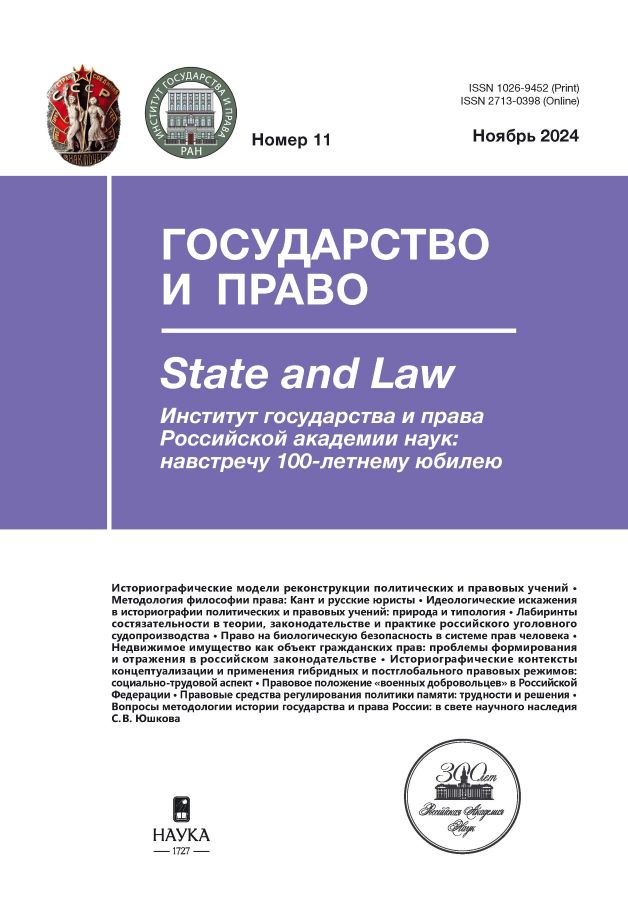Methodology of the philosophy of law: Kant and russian lawyers
- Authors: Frolova E.A.1
-
Affiliations:
- Lomonosov Moscow State University
- Issue: No 11 (2024)
- Pages: 23–32
- Section: Philosophy of law
- URL: https://rjmseer.com/1026-9452/article/view/649046
- DOI: https://doi.org/10.31857/S1026945224110022
- ID: 649046
Cite item
Abstract
The article examines issues of the Philosophy of Law from the position of Kant and Russian Neo-Kantians. The difference between the principle of necessity (based on the natural course of things) and the principle of obligation (applied to the sphere of morality) is shown. According to the principle of ethical obligation, each person is recognized as an end in itself, and all persons are considered equal. The focus of Russian Neo-Kantian lawyers is the process of implementing the transition from formal ethics to the Philosophy of Law, which combines the requirements of the moral law and political and legal phenomena. Following Kant, Russian lawyers argued that the state should not impose models of justice on the population – it should create conditions under which everyone could freely choose what is good for them (happiness) and achieve what they want with the only limitation – not to violate the rights and freedoms of others members of society. During the period of conflict of interests of various social groups, domestic Neo-Kantian lawyers sought to find ways of peaceful social development. The core of their concepts created confidence in the positive meaning of morality, tradition, law and the state.
Keywords
Full Text
About the authors
Elizaveta A. Frolova
Lomonosov Moscow State University
Author for correspondence.
Email: theory.law.msu@gmail.com
Doctor of Law, Professor, Head of the Department of Theory of State and Law and Political Science, Faculty of Law
Russian Federation, 1 Leninskie Gory, bld. 13 (4th academic building), 119991 MoscowReferences
- Alekseev N. N. Fundamentals of the Philosophy of Law. SPb., 1999. Pp. 80–93 (in Russ.).
- Windelband V. Immanuel Kant (To the centenary of his philosophy) // Windelband V. Preludes: philosophical articles and speeches / transl. from German and introduction by S. Frank. M., 2011. P. 110 (in Russ.).
- Hegel G. V.F. Philosophy of Law. M., 1990. P. 89 (in Russ.).
- Hessen S. I. The rule of law and socialism // Hessen S. I. Selected essays. M., 1999. Pp. 231, 232 (in Russ.).
- Groysman S. Law and morality. The problem of legal validity in the reading of modern legal positivism. Sofia, 2017.
- Jellinek G. The socio-ethical significance of law, injustice and punishment. M., 1910. Pp. 60, 61 (in Russ.).
- Kant I. Criticism of practical reason. 3rd ed. SPb., 2007. Pp. 83, 90, 277, 278 (in Russ.).
- Kant I. Essays: in 4 vols. in German and Russian. Vol. I. Treatises and articles (1784–1796). M., 1994. Pp. 323– 325, 353–477 (in Russ.).
- Kistyakovsky B. A. Social sciences and law: essays on the methodology of social sciences and General theory of law. M., 1916 // Kistyakovsky B. A. Philosophy and Sociology of Law / comp., note., decree. V. V. Sapov. P. 393 (in Russ.).
- Kistyakovsky B. A. Philosophy and Sociology of Law / comp., note., decree. V. V. Sapov. SPb., 1998. Pp. 120, 125– 127, 129, 131 (in Russ.).
- Krotkova N. V. All-Russian Scientific Conference with international participation “The concept of law: history and theory (for the 300th anniversary of the birth of Immanuel Kant)” // State and Law. 2024. No. 9. Pp. 212–231. doi: 10.31857/S1026945224090203 (in Russ.).
- Novgorodtsev P. I. Moral idealism in the Philosophy of Law (On the question of the revival of natural law) // Problems of idealism: collection of articles / ed. by P. I. Novgorodtsev. M., 1903. P. 296 (in Russ.).
- Novgorodtsev P. I. On the ways and tasks of the Russian intelligentsia. From the depths: collection of articles on the Russian Revolution. M., 1991. P. 244 (in Russ.).
- Novgorodtsev P. I. On the social ideal. M., 1991. P. 174 (in Russ.).
- Nenovski N. Law and Values. M., 1987 (in Russ.).
- Piontkovsky A. A. Kant’s theory of law and the state. Philosophy of Kant and modernity / under the general ed. of T. I. Oizerman. M., 1974. P. 160 (in Russ.).
- Savalsky V. A. Fundamentals of Philosophy of Law in scientific idealism. Marburg School of Philosophy: Kogen, Natorp, Shtammler et al. M., 1909. Vol. 1. P. 265 (in Russ.).
- Torbov Ts. Basic principles of law. Law and Justice. Sofia, 1940. Pp. 208–216.
- Philosophy of Law. Dictionary. 2nd ed., rev. and add. / ed. by and comp. V. N. Zhukov. M., 2021. Pp. 273–278 (in Russ.).
- Frolova E. A. Philosophy of Law in Russia: Neo-Kantianism (the second half of the XIX – the first half of the XX century). M., 2019. Pp. 8–11 (in Russ.).
- Khvostov V. M. General theory of law: an elementary essay. 5th ed. M., 2011. P. 45 (in Russ.).
- Shtammler R. The essence and tasks of law and jurisprudence / transl. from German by V. A. Krasnokutsky. M., 1908 (in Russ.).
Supplementary files











